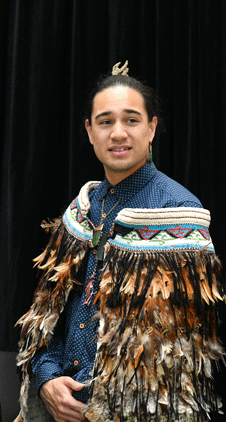Thursday 12 December 2019 10:57pm

Jovan James Mokaraka-Harris.
Jovan James Mokaraka-Harris (Ngā Puhi, Te Rarawa, Ngāti Wai) credits his supervisors for his postgraduate diploma with giving him a continual pursuit of education at the University of Otago.
Jovan is graduating in absentia with a Master of Arts in Geography.
His master's, entitled Rū Te Whakaturu Whenua: Understanding Hapū Relationships Through Cultural Mapping, was born out of a conversation while driving to Kaitaia in the far north with his uncle.
“My uncle told me, ‘Boy, did you know there is a urupā here?’ It was a road and we were driving over it. On reflection I asked myself, why is there a road over our urupā when we have so many protocols and tikanga when it comes to wāhi tapu,” Jovan says.
This prompted Jovan to take a further look at how humans behave within certain spaces and places. He was interested in learning "why this does not count here, and what are our relationships with mapping, with space?"
Three main findings came from Jovan’s master's thesis, including the relationships we have with natural ecosystems and how this impacts on boundaries and behaviours within particular spaces. Another was the spiritual relationship with hapū mapping practices.
"... my supervisors have always backed me 100 per cent. If I ever follow the path of academia, I hope to emulate that kind of support for future Māori tauira."
“Ara wairua or the path taken by spirits was important and impacted on activities that we can and can’t have with these spaces and why they shouldn’t be developed,” he explains.
Another key finding was hapū relationships with place names and the knowledge attached to place names which have spiritual relevance to the hapū.
“We have a place traditionally known as Manuoha. It was a place where particular birds would flock, hence the name. Nowadays you could refer to it as Puke Rāpihi (small rubbish mountain) because it’s a dumpsite, an illegal dumpsite.”
Jovan’s research highlights that awareness or knowledge of place names and the significance of those place names determine our interactions with that place or space.
“How can we adapt traditional ways of mapping and apply this in today’s society?”
This is what Jovan will endeavour to explore now as he furthers his studies with a PhD at the University of Otago.
“If we look at our environment, say the pūkeko, when it has its young they are reared by everyone not just the parents, much like the korero where it takes a village to raise a child. Our tūpuna used their environment to inform their relationships and behaviours.”
This is something Jovan hopes we can reignite to guide us in the future.
"There were people at my school who were bright, people who would have thrived at university. You don’t have to be the brightest or smartest, you just have to be brave."
“All through my degree, my postgraduate diploma and master's, my supervisors have been supportive. This is a non-indigenous space with foreign paradigms that Māori do not necessarily fit into. Sometimes my scope did not conform to the norm and may have been far-fetched. However, my supervisors have always backed me 100 per cent. If I ever follow the path of academia, I hope to emulate that kind of support for future Māori tauira.”
Jovan believes in creating a space for indigenous knowledge to thrive “regardless of the fact that you don’t fit in, it’s ok”.
When asked what advice he had for Māori leaving high school and venturing out in to the world, Jovan says, “Don’t let anyone tell you you can’t do something. I was told that, I was told I wouldn’t get into university, my English isn’t good even though it’s my first language - a university is not a place for you. I proved them wrong.”
Jovan believes these thoughts and perspectives only perpetuate a loss of potential.
“There were people at my school who were bright, people who would have thrived at university. You don’t have to be the brightest or smartest, you just have to be brave.”
